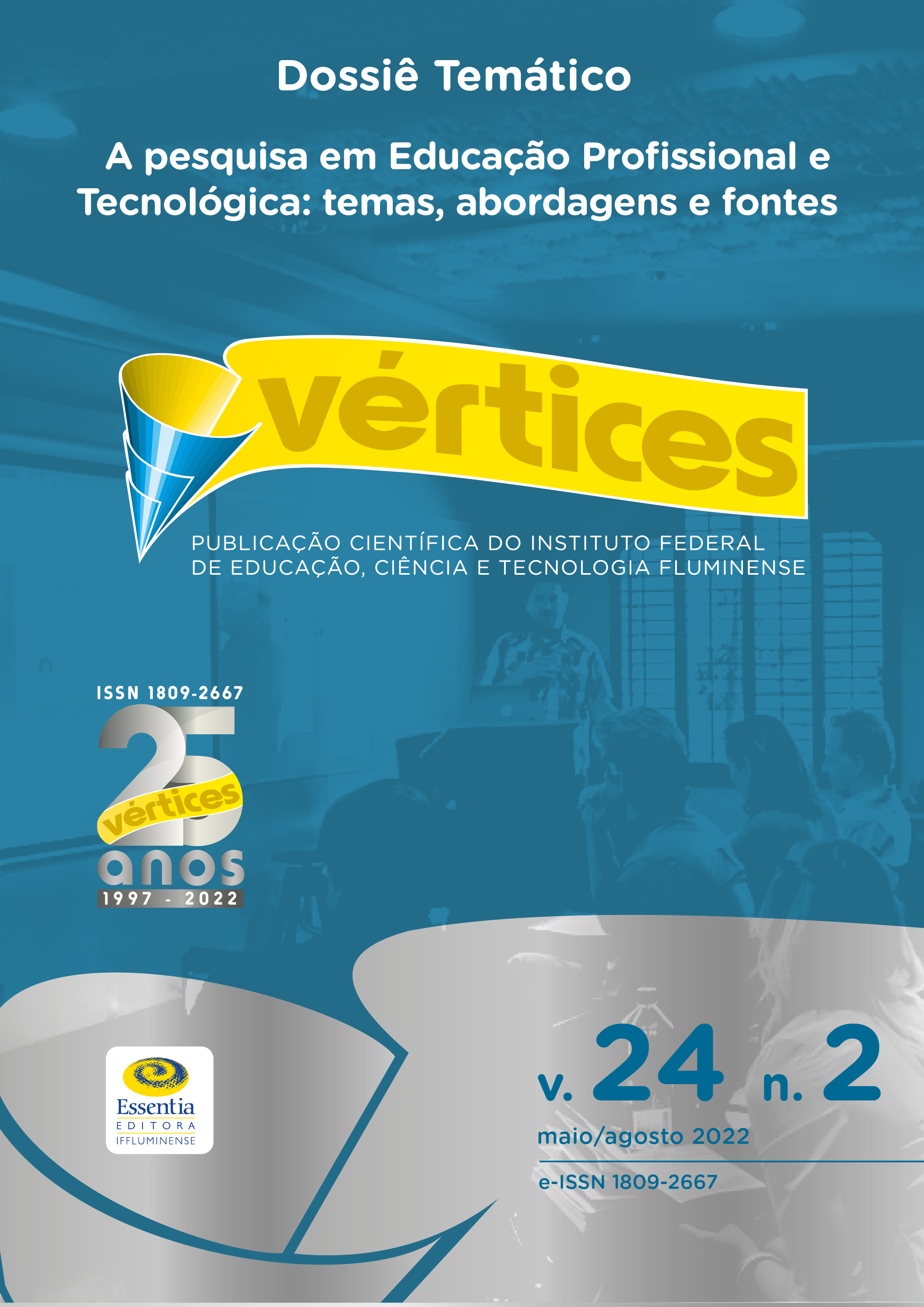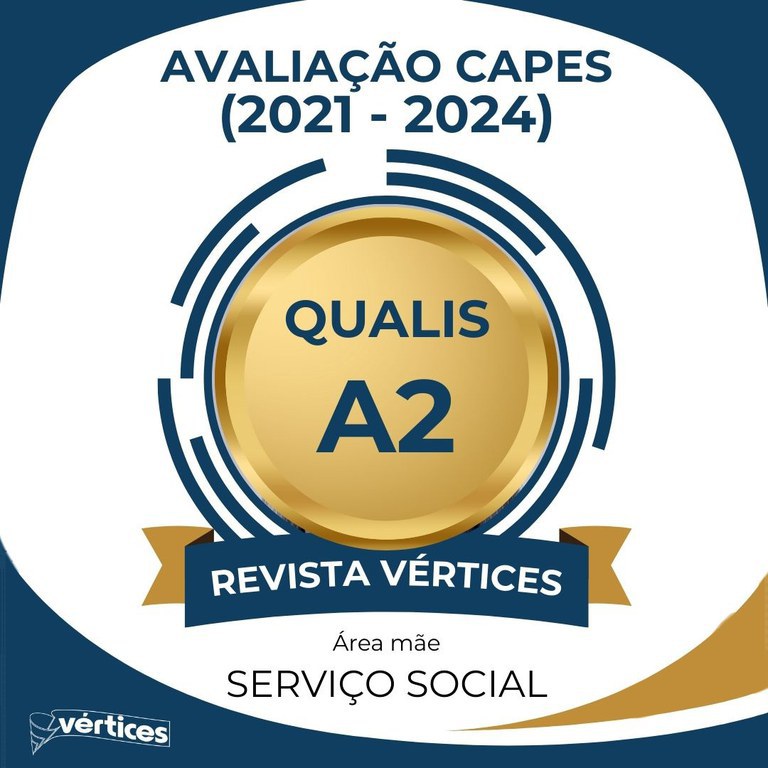Teachers' perceptions about the integrated curriculum at the Federal Institute of Education, Science and Technology of Rio Grande do Norte (IFRN)
DOI:
https://doi.org/10.19180/1809-2667.v24n22022p541-555Keywords:
Teaching, Professional Education (TVET), Integrated Curriculum, Pedagogical practiceAbstract
This research had its origin in studies undertaken in two Master's dissertations. It aimed to identify the perception of teachers about the integrated curriculum in the context of IFRN, through five categories of analysis, namely: a) conception of IP in the dissertations analyzed; b) relationship between IP and EMI; c) interdisciplinarity; d) relationship between IP and human formation; and e) challenges or limitations in the development of IP. The research was based on the following questions: how do the actors involved conceive IP? what are the contributions of IP for the materialization of the Integrated Curriculum in IFRN, and which challenges in the context of IP need to be overcome? The methodology used had a qualitative approach, supported by a bibliographic review, for covering the literature already made public regarding the production of the dissertations. In the theoretical composition, we operated with the support proposed by authors such as Imbernón (2011), Pena (2011), Silva (2014), Fazenda (2014), Henrique and Nascimento (2015), Pacheco, (2015), Santos and Souza (2021), among others. The results found pointed out that the two dissertations analyzed allow a reflection about the practices of the integrated curriculum. The limitations presented in these studies suggest the possibility of changes in teaching-learning practices to strengthen interdisciplinarity and form a subject that thinks and acts beyond the labor market.Downloads
References
BARDIN, L. Análise de conteúdo. São Paulo: Edições 70, 2011.
CIAVATTA, M. A interdisciplinaridade e a formação integrada: exercício teórico ou realidade possível? In: CIAVATTA, M. O trabalho docente e os caminhos do conhecimento: A historicidade da educação profissional. Rio de Janeiro: Lamparina, 2015.
FAZENDA, I. C. Interdisciplinaridade: qual o sentido. São Paulo: Paulus, 2003.
FAZENDA, I. C. Interdisciplinaridade: um projeto em prática. 7. ed. São Paulo: Loyola, 2014.
FAZENDA, I. C. Integração e interdisciplinaridade no ensino brasileiro. São Paulo: Cortez, 2011.
FREIRE, P. Pedagogia da autonomia: saberes necessários à prática educativa. 37. ed. São Paulo: Paz e Terra, 1996.
FRIGOTTO, G. Concepções e mudanças no mundo do trabalho e no Ensino Médio. In: FRIGOTTO, G.; CIAVATTA, M.; RAMOS, M. (org.). Ensino Médio Integrado: concepções e contradições. São Paulo: Cortez, 2005.
HENRIQUE, A. L. S; NASCIMENTO, J. M. Sobre práticas integradoras: um estudo de ações pedagógicas na educação básica. HOLOS, Natal, v. 4, 2015 31, p. 63-73, jul. 2015. DOI: https://doi.org/10.15628/holos.2015.3188. Disponível em: https://www2.ifrn.edu.br/ojs/index.php/HOLOS/article/view/3188. Acesso em: 23 ago. 2022.
IMBERNÓN, F. Formação docente e profissional: formar-se para a mudança e incerteza. São Paulo: Editora Cortez, 2011.
INSTITUTO FEDERAL DE EDUCAÇÃO, CIÊNCIA E TECNOLOGIA DO RIO GRANDE DO NORTE. Projeto político-pedagógico do IFRN: uma construção coletiva, Documento Base. Natal-RN: IFRN, 2012a.
INSTITUTO FEDERAL DE EDUCAÇÃO, CIÊNCIA E TECNOLOGIA DO RIO GRANDE DO NORTE. Organização Didática do IFRN. Natal-RN: IFRN, 2012b.
INSTITUTO FEDERAL DE EDUCAÇÃO, CIÊNCIA E TECNOLOGIA DO RIO GRANDE DO NORTE. Projeto pedagógico do curso técnico de nível médio em Informática na forma integrada presencial. Natal, IFRN, 2012c.
INSTITUTO FEDERAL DE EDUCAÇÃO, CIÊNCIA E TECNOLOGIA DO RIO GRANDE DO NORTE. Projeto pedagógico do projeto pedagógico do curso técnico de nível médio em edificações na forma Integrada, presencial. Natal, IFRN, 2012d.
LEITE, M. C. S. N. C. O projeto integrador no ensino médio integrado: intervenção pedagógica para docentes na educação profissional e tecnológica. 2022. 82 f. Dissertação (Mestrado em Educação Profissional e Tecnológica) – Instituto Federal de Educação, Ciência e Tecnologia do Rio Grande do Norte, 2022.
LIBÂNEO, J. C. Organização e gestão da escola: teoria e prática. 5. ed. Goiânia: Editora Alternativa, 2004.
MANRIQUE, A. L. Processo de Formação de Professores em Geometria: mudanças em concepção e práticas. 2003. Tese (Doutorado em Psicologia da Educação) – Programa de Estudos Pós-Graduados em Psicologia da Educação, Pontifícia Universidade Católica de São Paulo, São Paulo, 2003.
MINAYO, M. C. S. (org.). Pesquisa social: teoria, método e criatividade. Petrópolis: Vozes, 2001.
MONTEIRO, C. Mudam-se Concepções, Mudam-se Práticas. In: BROWN, M. et al. (org.). Educação Matemática. Portugal: Instituto de Inovação Educacional, 1992. p. 241-247. (Coleção Temas de Investigação).
PACHECO, E. Fundamentos Político-Pedagógicos dos Institutos Federais: diretrizes para uma educação profissional e tecnológica transformadora. Natal: Editora IFRN, 2015.
PENA, G. A. C. Formação docente e aprendizagem da docência: um olhar sobre a educação profissional. Educação em Perspectiva, Viçosa, v. 2, n. 1, p. 106, jan./jun. 2011. Disponível em: https://periodicos.ufv.br/educacaoemperspectiva/article/view/6491. Acesso em: 23 ago. 2022.
PIMENTA, S. G.; ANASTASIOU, L. Docência no ensino superior. 3. ed. São Paulo: Cortez, 2008. p. 11-17.
SANTOS, L. A. S. Projetos integradores no IFRN: reflexões sobre os documentos norteadores e o contexto da prática no Campus Mossoró. 2018. 118 f. Dissertação (Mestrado em Ensino) – Instituto Federal de Educação, Ciência e Tecnologia do Rio Grande do Norte, Universidade Estadual do Rio Grande do Norte, Universidade Federal do Semi-Árido, 2018. Disponível em: https://memoria.ifrn.edu.br/handle/1044/1644. Acesso em: 28 fev. 2020.
SANTOS, L. A. S.; SOUZA, F. C. S. Projetos integradores: contributos à práxis pedagógica na educação profissional. Curitiba: Brazil Publishing, 2021.
SILVA, A. L. Currículo Integrado. Florianópolis: Publicações do IFSC, 2014.
YIN, R. K. Pesquisa qualitativa do início ao fim. Porto Alegre: Penso Editora, 2016. (Coleção Métodos de Pesquisa).
Published
Issue
Section
License
Copyright (c) 2022 Luiz Antonio da Silva dos Santos , Maria da Conceição Souza do Nascimento Carlos Leite , Francisco das Chagas Silva Souza

This work is licensed under a Creative Commons Attribution 4.0 International License.
The authors of the manuscript submitted to Vértices, hereby represented by the corresponding author, agree to the following terms:
The authors retain the copyright and grant Vértices the right of first publication.
At the same time the work is licensed under the Creative Commons Attribution 4.0 International License, allowing third parties to copy and redistribute the material in any medium or format and to remix, transform, and build upon its content for any legal purpose, even commercially, provided the original work is properly cited.
Authors will not receive any material reward for the manuscript and Essentia Editora will make it available online in Open Access mode, through its own system or other databases.
Authors are authorized to enter into additional contracts separately for non-exclusive distribution of the version of the work published in Vértices (eg, publish in institutional repository or as book chapter), with acknowledgment of authorship and initial publication in this journal.
Authors are permitted and encouraged to disseminate and distribute the post-print (ie final draft post-refereeing) or publisher's version/PDF at online information sources (eg, in institutional repositories or on their personal page) at any time after the first publication of the article by Vértices.
Essentia Editora may make normative, orthographic and grammatical changes in the originals in order to maintain the standard language, with the final consent of the authors.
The content and opinions expressed in the manuscript are the sole responsibility of the author (s).
























1.png)



